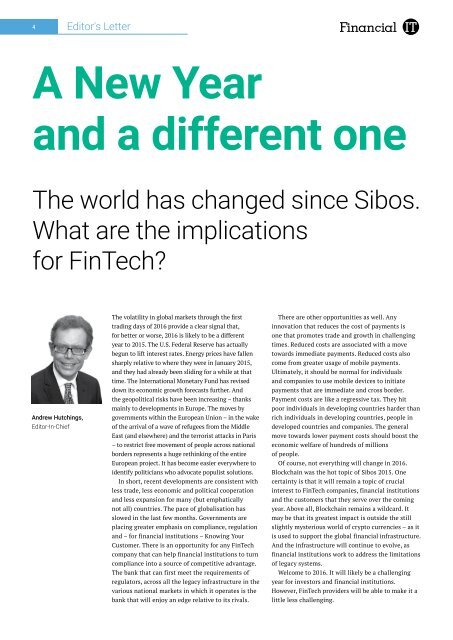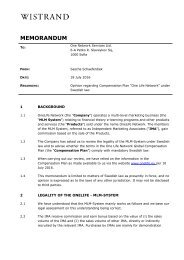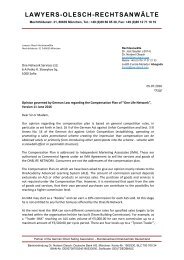Revolutionizing the Financial Markets
With more than 100 000 subscribers of which 70% are banks, Financial IT is focused on publishing news about the leading financial technologies in the world, including the blockchain technology and cryptocurrencies. The February issue of the magazine dedicates its cover to the Founder and CEO of OneCoin, Dr. Ruja Ignatova, and with a 2 pages article sharing OneCoin's story & vision to the world. As Financial IT continies to follow the developments in the company, we are pleased to be recognized as one of the major cryptocurrencies and a key player that shapes the future of payments.
With more than 100 000 subscribers of which 70% are banks, Financial IT is focused on publishing news about the leading financial technologies in the world, including the blockchain technology and cryptocurrencies.
The February issue of the magazine dedicates its cover to the Founder and CEO of OneCoin, Dr. Ruja Ignatova, and with a 2 pages article sharing OneCoin's story & vision to the world. As Financial IT continies to follow the developments in the company, we are pleased to be recognized as one of the major cryptocurrencies and a key player that shapes the future of payments.
Create successful ePaper yourself
Turn your PDF publications into a flip-book with our unique Google optimized e-Paper software.
4<br />
Editor's Letter<br />
A New Year<br />
and a different one<br />
The world has changed since Sibos.<br />
What are <strong>the</strong> implications<br />
for FinTech?<br />
Andrew Hutchings,<br />
Editor-In-Chief<br />
The volatility in global markets through <strong>the</strong> first<br />
trading days of 2016 provide a clear signal that,<br />
for better or worse, 2016 is likely to be a different<br />
year to 2015. The U.S. Federal Reserve has actually<br />
begun to lift interest rates. Energy prices have fallen<br />
sharply relative to where <strong>the</strong>y were in January 2015,<br />
and <strong>the</strong>y had already been sliding for a while at that<br />
time. The International Monetary Fund has revised<br />
down its economic growth forecasts fur<strong>the</strong>r. And<br />
<strong>the</strong> geopolitical risks have been increasing – thanks<br />
mainly to developments in Europe. The moves by<br />
governments within <strong>the</strong> European Union – in <strong>the</strong> wake<br />
of <strong>the</strong> arrival of a wave of refugees from <strong>the</strong> Middle<br />
East (and elsewhere) and <strong>the</strong> terrorist attacks in Paris<br />
– to restrict free movement of people across national<br />
borders represents a huge rethinking of <strong>the</strong> entire<br />
European project. It has become easier everywhere to<br />
identify politicians who advocate populist solutions.<br />
In short, recent developments are consistent with<br />
less trade, less economic and political cooperation<br />
and less expansion for many (but emphatically<br />
not all) countries. The pace of globalisation has<br />
slowed in <strong>the</strong> last few months. Governments are<br />
placing greater emphasis on compliance, regulation<br />
and – for financial institutions – Knowing Your<br />
Customer. There is an opportunity for any FinTech<br />
company that can help financial institutions to turn<br />
compliance into a source of competitive advantage.<br />
The bank that can first meet <strong>the</strong> requirements of<br />
regulators, across all <strong>the</strong> legacy infrastructure in <strong>the</strong><br />
various national markets in which it operates is <strong>the</strong><br />
bank that will enjoy an edge relative to its rivals.<br />
There are o<strong>the</strong>r opportunities as well. Any<br />
innovation that reduces <strong>the</strong> cost of payments is<br />
one that promotes trade and growth in challenging<br />
times. Reduced costs are associated with a move<br />
towards immediate payments. Reduced costs also<br />
come from greater usage of mobile payments.<br />
Ultimately, it should be normal for individuals<br />
and companies to use mobile devices to initiate<br />
payments that are immediate and cross border.<br />
Payment costs are like a regressive tax. They hit<br />
poor individuals in developing countries harder than<br />
rich individuals in developing countries, people in<br />
developed countries and companies. The general<br />
move towards lower payment costs should boost <strong>the</strong><br />
economic welfare of hundreds of millions<br />
of people.<br />
Of course, not everything will change in 2016.<br />
Blockchain was <strong>the</strong> hot topic of Sibos 2015. One<br />
certainty is that it will remain a topic of crucial<br />
interest to FinTech companies, financial institutions<br />
and <strong>the</strong> customers that <strong>the</strong>y serve over <strong>the</strong> coming<br />
year. Above all, Blockchain remains a wildcard. It<br />
may be that its greatest impact is outside <strong>the</strong> still<br />
slightly mysterious world of crypto currencies – as it<br />
is used to support <strong>the</strong> global financial infrastructure.<br />
And <strong>the</strong> infrastructure will continue to evolve, as<br />
financial institutions work to address <strong>the</strong> limitations<br />
of legacy systems.<br />
Welcome to 2016. It will likely be a challenging<br />
year for investors and financial institutions.<br />
However, FinTech providers will be able to make it a<br />
little less challenging.





